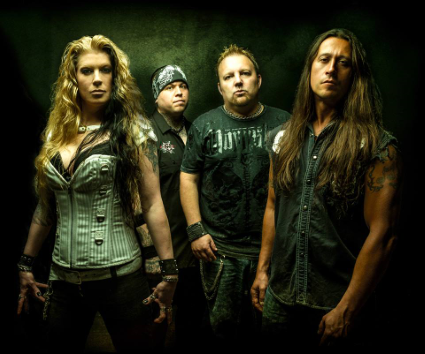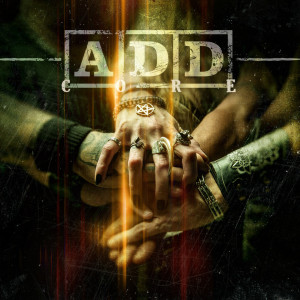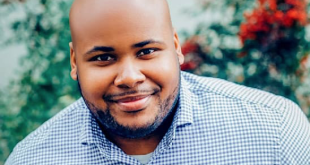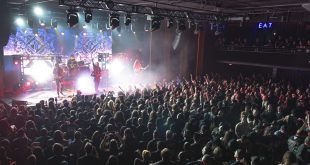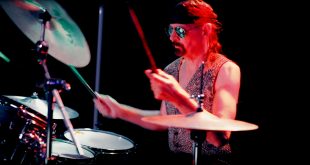The evolution of digital music has drastically changed the way in which people discover music, granting audiences access to an endless variety of sounds like never before. But, if you find yourself overwhelmed by the accessibility of electro beats and boisterous tunes, focus your senses with a hearty dose of A.D.D.
From collaborating with Grammy Award-winning producer, Trevor Sadler, to sharing the stage with heavyweights like KORN and Halestorm, A.D.D proves it’s a force to be reckoned with within the hard rock scene. With the release of their second full-length album, Core, A.D.D has received extensive airplay within their native Chicago, generating a great deal of local buzz. With hard-hitting riffs that harmonize with the raw, edgy vocals of lead vocalist, Margaret Young, Core is a testament that A.D.D does not strive to pique your interest; they demand your undivided attention.
In this interview with Music Existence, A.D.D guitarist, Dave Adams, discusses the meaning behind Core, the challenges of being a female-fronted band, and the band’s desire to expand their presence beyond the Midwest.
ME: The thing that immediately stands out about the band is its name: A.D.D. It’s definitely an attention grabber, considering most people’s first thought isn’t music when they see that acronym. Why did the band choose the name A.D.D?
DAVE: (Laughs) Well, you know, I wish I had a more intriguing story, but the reality is before A.D.D, I was in a band with a complicated name, and everyone always screwed it up. We decided when we started this band we were going to come up with a simplistic name so it would make life easy everyone. Boy was I wrong about that (laughs)! But we came up with A.D.D because I was influenced by a lot of bands – I’m huge KISS fan, for instance – that had simple catchy, straightforward names that promoters and people can’t screw up. My thoughts were if we took three letters like “A.D.D,” it would be intriguing. It started out as “Attention Deficit Disorder,” of course. Then the Internet become very prevalent in most musicians’ careers, so once people starting searching for that, instead of the band, it came up as medical terms. After a few years, we decided to change the acronym’s meaning into something that represented the band a little better, so we came up with “Analog Digital Disorder.” “Analog” being a more old-school kind of sound before they came up with digital recording. “Digital” is obviously more of the modern sound. Because we feel we’re a mix of the two, we thought it was a fitting meaning for the band.
ME: You mentioned that you’d been part of another band before A.D.D, so what forces led to the creation of the A.D.D we see today?
DAVE: We had an EP out in 2003, believe it or not. Margie and myself were the only members on that EP. Jeremy [Sparta], our other guitar player, joined the band in 2004. Randy, our bass player who had been with us for quite a while up until two years ago, joined the band around the end of ‘03. Like any other band, it took us a few years to figure out what we were doing as far as our sound. When Elements of Emptiness came out in 2007, that was our first full-length release, but we’d actually started playing and rehearsing in a garage as early as ‘03. It’s been a long process (laughs).
ME: Sometimes it seems the longer a band is out, the more likely they are to withdraw from their lineup rather than add to it.
DAVE: Yeah, it’s hard to keep people, of course, but, Margie, Jeremy, and I have been together going on 11 years. Jason [Delismon], our drummer, has been with us since 2009. We knew him from a previous band before he joined A.D.D. We’re a pretty tight-knit group of people who knew each other before we actually played in a band together.
ME: As a four-person band, how do your own individual personalities come together to contribute to the musical essence that makes A.D.D?
DAVE: Like any band I think we all have different influences. As far as song writing goes, Margie and Jeremy come up with a lot of the lyrics either individually or together, depending on the song. Jeremy is also the guitar player, so he comes up with the additional parts. It’s a very band-oriented process. Everyone contributes in some form. I probably come from a heavier side of music; Jeremy comes from a more melodic side in general. It doesn’t mean I only write heavier songs and Jeremy ballads, but just in general, it’s more of the case in that aspect. Margie, being a female vocalist, comes from a background of famous female-fronted bands: Fleetwood Mac, Joan Jett [and the Blackhearts], and other female vocalists that I may not have followed as closely as she did. It just comes from common ground in general, but we all have our own individual influences.
ME: Bands usually go through trials and tribulations as they come up. As a female-fronted band, it must have been that much harder.
DAVE: Yes, and it’s funny because our friends or other male-fronted bands would say, “Oh, you’re so lucky you have a girl in the band. People are going to ‘blah blah blah,’” you know, but that’s not true. Matter of fact, it’s the opposite. There are some people who judge us unfairly. As soon as they see us, there’s a different set of rules. They already have a preconceived notion or they had one before they knew the band. I’ve actually had people say they don’t like the band, and they’d never even listened to us; they just know that there’s a girl singing. I think in the end, it’s harder on Margie in the sense that all women have encountered something like this to a certain degree. There have been many times when we’d go to a club and the guy won’t let her in the door. When she tells them, “I’m the singer,” he’ll say, “Oh, well I thought you were a groupie.” I mean, that’s pretty challenging to deal with. It’s really unfair, but that’s some of the ignorance we face out there. Not all of the time, but we’ve definitely seen it happen.
ME: That has to be pretty rough.
DAVE: It is. I try to be there to make sure that doesn’t happen, but there’re just some people that have a preconceived notion about things. Female-fronted bands are more common now than there were when we first started. Back then, people looked at me like I was crazy for suggesting it like it was such an out-of-the-box kind of idea in 2003. It’s pretty funny because, if you think about that time period, there really wasn’t a lot of female-fronted music out there. I don’t think Evanescence had even broken out yet. They had to have been around the same time we were coming up. I didn’t even hear about them until after they’d broken into mainstream. I can remember laughing going, “Well, someone else thought it was a pretty good idea,” you know.
ME: Yeah, and they were pretty successful because they ended up winning a Grammy for Best New Artist the following year.
DAVE: Yeah, but the downfall to that was they were the only female-fronted band for a while, and I remember people wanting us to sound like that. That was kind of a problem we had because since there weren’t a lot of female-fronted bands to pick from, when we had labels interested in us, they wanted us to sound that way because that’s what was selling at the time. Obviously, now there are quite a few female-fronted bands, so it’s more common than it’s ever been. I’m amazed by the female-fronted bands I see out there. I think it’s a bit more accepted and more normal then 12 years ago. I know I sound like I’m talking about the ‘50s or something, but that’s what it was like.
ME: Let’s talk about your sound. You’d mentioned how A.D.D is a mixture old and new-school sounds. Who are some of the band’s musical influences and in what ways have they influenced the band’s sound?
DAVE: As a band, we have a lot of different influences, and as you can hear from the record, it’s all over the place. Obviously, Margie and Jeremy come from a vocal standpoint, so they could give you some influences which would make sense. Margie likes a lot of the underground artists. She likes a few mainstream artists, but there’re definitely more underground artists that she’s influenced by. There’s a band in the UK, Skunk Anansie, and the lead singer is called Skin. She’s amazing. Margie has influences from the classics as well like Stevie Nicks and Patt Benetar. She likes a lot of male vocalists as well. Like all of us, she’s listened to the classic metal singers like Geoff Tate from Queensrÿche, Judas Priests, and all those bands. The band as a whole is pretty influenced by Alice in Chains. Margie and Jeremy are definitely influenced by Sevendust and Lajons [Witherspoon], who has much more of a soulful sort of raw vocals.
ME: A.D.D performed with some heavyweight like KORN and Halestorm. What was it like to open for such huge acts as those bands?
DAVE: When you spend your time practicing, it’s one of those things you dream of. It was pretty surreal. We played a show in Iowa where it was Korn, Chevelle, and Halestorm and we were opening, and it’s like it’s not happening because time goes by so fast. Your set is 40 minutes, but it really feels like 5. The adrenaline level is just so high. It’s what everyone dreams of when you start playing music. I think that’s the goal for anybody that’s started playing, and we feel very privileged to play those shows. You think you’re very lucky to get a chance to do anything like that in your life. There’s nothing else that compares to that, and nothing can really replace that.
ME: Do you remember the reaction of the crowd at the time?
DAVE: It was amazing. I remember the first song ending – when you place small clubs, you’re used to hearing a handful of clapping and some cheers – and when the song stopped, I remember just hearing this roar. It was hard to comprehend at the moment (laughs). It was very overwhelming. I don’t know, maybe some people get used to it, but I don’t know if I would ever take that for granted.
ME: You’ve created a great deal of buzz within Chicago by performing in some of the city’s largest venues as well as receiving love from local radio stations. What do you think sets you apart from other bands in Chicago?
DAVE: I would say our persistence. We’ve been around a long time, and have stuck to our guns as to what we want to do. I don’t think we’ve ever really consciously paid attention to what the common fashion or trend was at the moment. We’ve been around long enough to see different trends come and go and a good song is a good song no matter what you label it. I think a lot of bands get caught up in what’s going at the moment in order to get bigger or get signed. We’ve always stuck with the idea that we’re going to write the best songs we can and stick to what we believe in, and hopefully people will be able to relate to it. It sounds simple, but a lot of bands will forget that over time as they try to get to another level. They’ll listen to other people who will tell them what they need to do and sometimes it’s not good advice. Bands should always stick to their gut feelings and true roots. I think that differentiated us from a lot of bands. We’re one of the hardest working bands out there, but at the end of the day you still have to have good music –music that is sincere and from the heart. If you try to write music that’s like the next popular band just to make it big, people can sense it. Music fans are smart and they can sense when something is fake. At least rock fans can.
ME: You recently released your second full-length album, Core. Of all names for an album, why Core?
DAVE: We were trying to come up with a name for the new record, and we really wanted to have a nice meaning behind it. After our bass player left a couple of years ago, Jeremy said, “Well, we’re down to the core. We’re the core-four.” Margie, Jeremy, Jason, and I have all stuck it out; we’ve stayed the core. We came up with this core-four thing, and we decided to call it Core. That’s why on the cover you see all of our hands in the middle. It just represents the four of us sticking it out together.
ME: What was the creative process like this second time around and how did it compare to making your first album, Elements of Emptiness?
DAVE: I think we learned a lot over time than when we first started. As a band, if you don’t have a lot of experience in the studio, you tend go in not really knowing the process of recording songs. It’s something that takes time. It’s an art to learn, and we worked for some really good producers over the years like Tadpole, who has worked with Disturbed, Staind, and 3 Doors Down. We’ve learned a lot from him about writing and recording songs. We took all of that knowledge and used it for this record. We’d also had Chris Wisco helping us with this album, and he’s recorded the band quite a few times over the years as well. He knows us pretty well because he knows what we’re trying to do. I think that combination allowed us to mature quite a bit, and I think you can hear it on the record. That time in between [releases] was a little longer then we would have liked, but it was time we spent maturing our song writing and really understanding what we were going for.
ME: Is there a particular track that stands out as a personal favorite?
DAVE: That’s really tough. I listen to the record and I like a lot of different tracks for different reasons. The first single, “I Regret,” is also the first track on the record, and I like it because it has an attitude and energy that captures what the band is about. Even though we have other styles of songs, I think that song is a very good representation of the band. I started out writing that song with an acoustic guitar on my couch, and to hear it finalized and finished, I’m really happy with it.
ME: You collaborated with Grammy Award-winning producer Trevor Sadler for Core. With the success of Core, are there any other musicians or producers you’d like to work with in the future?
DAVE: Yes, if I had my choice for the next record I’d work with producer Terry Date. He’s worked with Soundgarden. He’s an amazing producer, so if I had my choice of producers for this next record, he’d be pretty high on the list. As far as recording go, there are a lot of talented people out there that would be on the list, but Terry would be our number one choice of producers for sure.
ME: What do you hope to accomplish as a band in 2015?
DAVE: I think we just want to get to that next level where the band is really getting out there and playing across the United States and hopefully Europe. I think the goal is to really get out there to play for a lot of people who have wanted to see the band for some time now, to see familiar faces, and to explore places we’ve never seen before.
A.D.D new album, Core, is available now!
A.D.D Summer Tour Dates
- April 24 – On the Rox w/ Wayland – Jacksonville, IL
- May 7 – Meojoes w/ Black Stone Cherry – Joliet, IL
- May 8 – Silver Dollar Saloon – Elizabeth, MN
- May 9 – Rick’s Place – Fargo, ND
- May 10 – High Noon Saloon w/ Y&T – Madison, WI
- May 21 – Scooter’s – Sharewood, IL
- June 3 – Bada Brew w/ E&E – Crest Hill, IL
- June 05 – Metal Grill (Acoustic) – Milwaukee, WI
- June 06 – Bobby MCGee’s – Chicago Ridge, IL
- June 13 – Countyline Pub – Sandwich, IL
- June 25 – Mojoes w/ PM5K/Soil/3YH – Joliet, IL
- June 26 – Munchees – Beckley, WV
- June 27 – Shockwave Fest – Baltimore, MD
- June 28 – The Empire w/ Don Jameison – Akron, MD
- July 17 – Rockfest w/ Nickleback/Bush – Cadott, WI
- July 24 – Vintage Villians – Danville, IL
- July 25 – Mojoes – Joliet, IL
- July 30 – Part City Tavern w/ Bonz – Muskegan, MI
- July 31 – The Loft w/ Bonz – Lansing, MI
- August 2 – Cheers w/ Bonz – Southbend, IN
- August 7 – OddBody’s w/ Bonz – Dayton, OH
- August 8 – Emerson Theater w/ Bonz – Indianapolis, IN
Follow A.D.D for more information on new releases and tour dates.
 Music Existence Because of Music, We Exist
Music Existence Because of Music, We Exist
